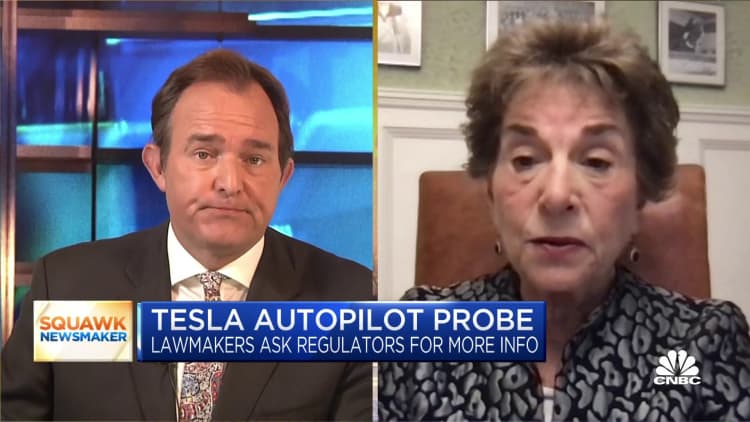Tesla braces its first trial involving Autopilot fatality

Autopilot features are demonstrated in a Tesla Model S during a Tesla event in Palo Alto, California
Beck Diefenbach | Reuters
The lawyer representing victims of a fatal crash of a Tesla Model 3 car in his opening statement in court on Thursday blamed the company’s Autopilot driver assistant system, saying that “a car company should never sell consumers experimental vehicles.”
An attorney for Tesla, in the first U.S. trial over allegations that its Autopilot feature led to a death, however, said the crash was the result of “a classic human error.”
The trial, in a California state court, stems from a civil lawsuit alleging the Autopilot system caused owner Micah Lee’s Model 3 to suddenly veer off a highway east of Los Angeles at 65 miles per hour, or 105 kph, strike a palm tree and burst into flames, all in the span of seconds.
The 2019 crash killed Lee and seriously injured his two passengers, including an 8-year-old boy who was disemboweled, according to court documents. The lawsuit, filed against Tesla by the passengers and Lee’s estate, accuses Tesla of knowing that Autopilot and other safety systems were defective when it sold the car.
Tesla said its Autopilot driver assistant system is not designed to make a sharp turn on a highway, as it defended the system’s safety.
Jonathan Michaels, an attorney for the plaintiffs, in his opening statement at the trial in Riverside, California, said that when the 37-year-old Lee bought Tesla’s “full self-driving capability package” for $6,000 for his Model 3 in 2019, the system was in “beta,” meaning it was not yet ready for release.
“A car company should never sell consumers experimental vehicles,” Michaels said.
Michaels said the car’s steering wheel made a sharp, 43-degree turn on a freeway, adding that “excessive steering command is a known issue at Tesla.”
Tesla denied the claims, saying its Autopilot system puts “guardrails” on the angle of the steering wheel at high speeds, making it capable of steering only a little bit left or right on highways.
Tesla also blamed the driver for being intoxicated.
“The case is not about Autopilot,” Michael Carey, an attorney for Tesla, said. “Autopilot makes a road safer. It is a good thing,” he said. “It is a classic human error that caused the crash.”
The electric-vehicle maker also claims it was not clear whether Autopilot was engaged at the time of the crash.
Tesla has been testing and rolling out its Autopilot and more advanced Full Self-Driving (FSD) system, which Chief Executive Elon Musk has touted as crucial to his company’s future but which has drawn regulatory and legal scrutiny.

Tesla won a bellwether trial in Los Angeles in April over a Tesla crash related to its Autopilot feature with a strategy of saying that it tells drivers that its technology requires human monitoring, despite the “Autopilot” name. In that incident in 2019, a Model S swerved into a curb and injured the driver. Jurors told Reuters after the verdict that they believed Tesla warned drivers about its system and that driver distraction was to blame.
The stakes are higher in the trial this week, and in other cases, because people died. Tesla and plaintiff attorneys jousted in the run-up about what evidence and arguments each side could make.
Tesla, for instance, won a bid to exclude some of Musk’s public statements about Autopilot. However, attorneys for the crash victims can argue that Lee’s blood alcohol content was below the legal limit, according to court filings.
The trial, in Riverside County Superior Court, is expected to last a few weeks.
https://www.cnbc.com/2023/09/29/tesla-braces-its-first-trial-involving-autopilot-fatality.html Tesla braces its first trial involving Autopilot fatality




